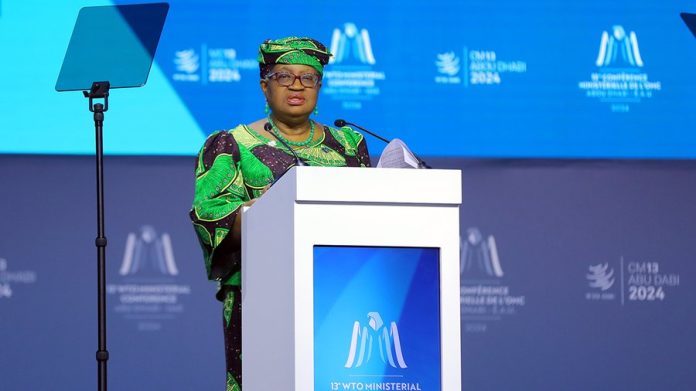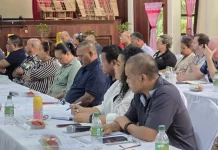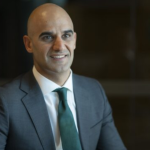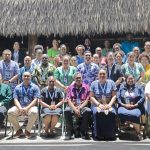The 13th WTO Ministerial Conference (MC13) opened in Abu Dhabi on Monday with a call to WTO members to seize the full potential of the multilateral trading system so that it delivers for the people it serves, accelerating the green transition and fostering socio-economic inclusion around the world.
WTO Director-General Ngozi Okonjo-Iweala urged members to show leadership, flexibility and compromise to deliver important outcomes at MC13 for people and the planet.
In his welcoming speech to the Conference, Dr Thani bin Ahmed Al Zeyoudi, Minister of State for Foreign Trade of the United Arab Emirates (UAE) and MC13 Chair, stressed the historically important role the WTO has played to provide “stability, transparency and predictability for international trade,” contributing to “raising living standards, improving employment opportunities and enabling the expansion of trade in goods and services” around the world.
The opening ceremony was attended by Sheikh Khaled bin Mohamed bin Zayed, Crown Prince of Abu Dhabi. Director-General Okonjo-Iweala thanked the UAE for their efficient organisation of the Ministerial Conference, the second to take place in the Gulf region after Doha in 2001.
“Trade runs through this nation’s blood. The UAE testifies to how trade can improve lives and livelihoods of people and transform a small or non-diversified economy into a formidable, resilient and prosperous one,” she said.
Recalling the successful outcome of the 12th WTO Ministerial Conference (MC12) in June 2022 in Geneva, where ten consensus multilateral outcomes with tangible benefits for people and the planet were achieved, DG Okonjo-Iweala noted that members sent a powerful signal that the WTO can respond to contemporary challenges through strategic cooperation in pursuit of shared goals.
“Success is changing the tone about the WTO, both outside and within it. We will always have our naysayers and detractors but there is no doubt that members have shown that we can deliver when members roll up their sleeves and muster the requisite political will. During the last several weeks, the atmosphere in our preparatory discussions in Geneva has been more constructive and conducive than it was in the run-up to MC12,” she said.
“Our challenge this week is to prove that we can still deliver and demonstrate that MC12 was not a one-off miracle on Lake Geneva. We need to convert improved atmospherics into concrete results. We need to show the world that not only does the WTO underpin over three-quarters of global goods commerce – it is also a forum where members deliver new benefits for people through trade,” she added.
WTO members will be seeking to secure “deliverables” during their four-day meeting in areas such as fisheries subsidies, agriculture, WTO reform, development, e-commerce, services and investment facilitation. Also on the ministers’ agenda will be how to make progress in their discussions on gender and the environment.
The opening session saw the adoption of the accessions of Comoros and Timor-Leste, both least-developed countries.
The President of Comoros, Azali Assoumani, and the President of Timor-Leste, José Manuel Ramos-Horta, signed the respective Protocols of Accession to the WTO, which were also signed by DG Okonjo-Iweala. Both governments will now submit their protocols for ratification by their legislative assemblies. In keeping with WTO rules, Comoros and Timor-Leste will become members of the WTO 30 days following the deposit of their respective instruments of acceptance of the Protocol.
Dr Thani bin Ahmed Al Zeyoudi said: “The decisions we have just taken on the accession of Comoros – an island LDC in Africa – and the accession of Timor-Leste – an island LDC in Asia – testify to the world’s confidence in the WTO and the multilateral trading system. I strongly believe that through their future membership in the WTO, Comoros and Timor-Leste will have stable and predictable frameworks for economic engagement with other nations which will boost trade, growth and prosperity.”
The MC13 opening ceremony also saw a wave of acceptances of the Agreement on Fisheries Subsidies. Eight members deposited their instruments of acceptance of the Agreement, putting the historic agreement for ocean sustainability on track for entry into force at record pace. Ministers of Brunei Darussalam, Chad, Malaysia, Norway, Rwanda, Saudi Arabia, Togo and Türkiye presented their instruments of acceptance to Director-General Okonjo-Iweala.
The MC13 Chair said: “This is a testament to your governments’ commitment to the sustainability of our oceans and to ensuring that multilaterally negotiated outcomes in the WTO are not only agreed – but implemented. As one of the early ratifiers, the United Arab Emirates welcomes the new ratifications as a reaffirmation of this collective commitment.”
A new element for ministers at MC13 will be deliberative sessions on trade and sustainable development, and on trade and inclusion. These sessions are intended to provide space for engagement on issues at the centre of contemporary economic debate and the future of trade policy. “We have put questions to ministers to facilitate constructive discussions. These sessions are an experiment – one that I hope will go well so that we can replicate that in the future,” said DG Okonjo-Iweala.
Amidst a very challenging geopolitical and economic environment with higher prices for food, energy and other essentials, shipping disruptions in vital waterways and upcoming elections in some 60 countries this year, trade remains resilient, DG Okonjo-Iweala highlighted.
“Despite everything we have been through, global goods and services trade remain at or near record highs. International markets anchored in the rules-based global trading system have stayed broadly open, helping businesses, households and economies adapt and adjust to one shock after another. But it would be dangerously naïve to take trade’s continued resilience for granted,” she said.
She also stressed that multilateralism is under attack. “Despite the MC12 fightback, the multilateral trading system, which I term a global public good since it was created 75 years ago, continues to be misconstrued in some quarters and undermined,” she said.
However, trade remains critical to delivering on many national and global priorities: boosting growth, expanding economic opportunities, meeting the Sustainable Development Goals, and solving collective action problems like protecting our environment or preparing for the next pandemic, she said.
“Without cooperation on trade, we would move towards an increasingly fragmented world economy, and all of these priorities would become harder, costlier, and in some cases impossible to achieve. People would become more disappointed, more vulnerable, more frustrated. In light of these realities, we need the WTO to stand strong as it approaches its 30th anniversary,” she added.













